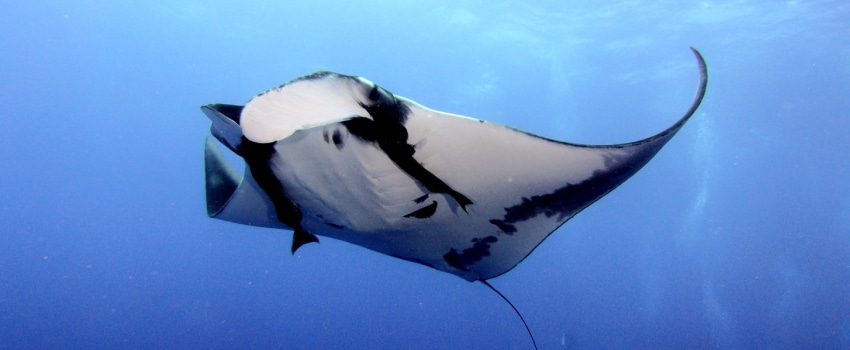
For years the rays and sharks that live in the open ocean would have avoided human contact. However, since the 1950’s the industrial scale of fishing has meant that even the remotest waters are being fished. A new study has revealed that the numbers of open ocean sharks and rays has declined by 70% over the last 50 years.
Declining populations is not a new headline. Marine biologists raised the alarm years ago, but often with a regional focus. However, the regional data has now been pieced together to give a global flavour of marine populations in the open ocean.
31 species in decline
The result of analysing the data has shown that there has been a 70% population decline in the 31 species that were examined. More than half are now endangered or critically endangered. In 1980, from that same group of 31 species, only the basking shark was thought endangered. The speed of decline is alarming.
Huge amounts of data were analysed to give population numbers for sharks and rays. It has required an assessment of the 31 species over a 38 year period. Manta ray populations have suffered some of the worst losses.
Why the decline?
The greatest issue is overfishing. The open ocean method of longline fishing has doubled during the last 50 years. Longline fishing involves 100km lines with over a 1000 baited hooks being used on a daily basis. There are thousands of fishing vessels using this method around the world. This not only catches unsustainable amounts of desired fish, but also huge quantities of by-catch (unwanted fish). The study made use of data from the fishing industry, however, unreported catches are not included, so the number of sharks and rays killed is likely to be underestimated.
One of the difficulties with industrial scale fishing is that even if the sharks and rays are thrown back they can sustain such bad injuries during the process they don’t survive. Sharks and rays are slow to reproduce, and their rate of reproduction is no match for the rate of being fished.
Immediate action needed
The rate of overfishing is not being managed by fishing regulations. The open oceans, where rays and sharks are being caught, are outside national waters. So there needs to be an agreement between fishing nations about conservation. However, national fisheries don’t follow scientific advice. For instance in November 2020 the EU and US fishing regulators blocked a catch ban for North Atlantic shortfin mako sharks despite evidence that it was required in order to restore the endangered species. To start a recovery of shark and ray populations we need a strict ban of fishing these species and to limit by-catch.
Strict enforcement required.
Reducing by-catch is a crucial step but a challenging one. A change to the long line fishing method is needed so that catch and release sharks and rays have an improved survival rate.
Marine populations would also benefit from fishing fleets being banned from shark and ray hotspots. The UN is currently leading negotiations to create marine reserves in the high seas to protect open ocean species. This latest study highlighting a 70% population decline should add strength to that initiative.
If you would like to support conservation efforts for manta rays please visit our Manta Trust page.





